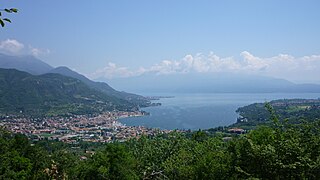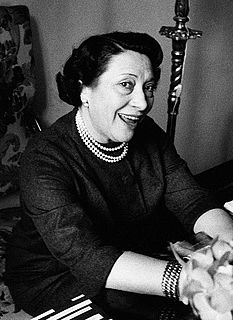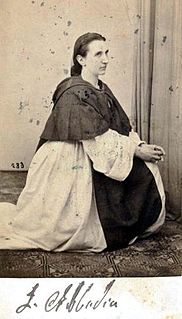
Renata Tebaldi was an Italian lirico-spinto soprano popular in the post-war period, and especially prominent as one of the stars of La Scala, San Carlo and, especially, the Metropolitan Opera. Often considered among the great opera singers of the 20th century, she focused primarily on the verismo roles of the lyric and dramatic repertoires. Italian conductor Arturo Toscanini called her voice "la voce d'angelo", and La Scala music director Riccardo Muti called her "one of the greatest performers with one of the most extraordinary voices in the field of opera."

Cecilia Bartoli, Cavaliere OMRI is an Italian coloratura mezzo-soprano opera singer and recitalist. She is best known for her interpretations of the music of Bellini, Handel, Mozart, Rossini and Vivaldi, as well as for her performances of lesser-known music from the Baroque and Classical period. She is known for having the versatility to sing both soprano and mezzo roles.

Salò is a town and comune in the Province of Brescia in the region of Lombardy on the banks of Lake Garda, on which it has the longest promenade. The city was the seat of government of the Italian Social Republic from 1943 to 1945, with the ISR often being referred to as the "Salò Republic".

Mafalda Favero was an Italian operatic soprano.
Maria Zamboni was an Italian operatic soprano who had a prolific career in Italy and South America between 1921 and 1936. Admired for her vivid character portrayals and expressive singing, Zamboni was a popular and frequent performer at both La Scala and the Teatro Costanzi. Her repertoire encompassed a broad spectrum, from Verdi and Wagner heroines to French grand opera and verismo roles. She became particularly associated with the works of Giacomo Puccini and notably sang the role of Liu in the original 1926 production of Turandot.
Cloë Elmo was an Italian operatic mezzo-soprano, particularly associated with the Italian repertory.

Violeta Urmana is a Lithuanian opera singer who has sung leading mezzo-soprano and soprano roles in the opera houses of Europe and North America.

Luigia Abbadia (1821–1896) was an Italian operatic mezzo-soprano known for her fine voice, secure technique, and a strong temperament. Possessing an uncommonly wide range, Abbadia sang several roles traditionally portrayed by sopranos in addition to roles from the mezzo-soprano repertoire.

Maria Labia was an Italian operatic soprano who was particularly associated with roles of the verisimo repertoire.

Gioseppa Maria Camilla, commonly known as Giuseppina, Grassini was a noted Italian contralto, and a singing teacher. She was also known for her affairs with Napoleon and the Duke of Wellington. She sang in various productions by composers such as Cimarosa, Cherubini and Zingarelli.

Teresa Stolz was a Bohemian soprano, long resident in Italy, who was associated with significant premieres of the works of Giuseppe Verdi, and may have been his mistress. She has been described as "the Verdian dramatic soprano par excellence, powerful, passionate in utterance, but dignified in manner and secure in tone and control".

Giuseppina Pasqua was an Italian opera singer who performed throughout Italy and Europe from the late 1860s through the early 1900s. She began her career as a soprano when she was only 13, but later retrained her voice as a mezzo-soprano. She sang in several world premieres, but is most remembered today for having created the role of Mistress Quickly in Giuseppe Verdi's Falstaff. The composer wrote the role specifically for her and dedicated the act 2 aria "Giunta all' albergo" to Pasqua. She was married to the baritone Astorre Giacomelli.

Teresa Brambilla was a celebrated Italian soprano most remembered today for having created the role of Gilda in Verdi's opera, Rigoletto. During a career that spanned 20 years, she sang throughout Italy and in other European cities, including Paris, Barcelona and Odessa.

Pretty Yende is a South African operatic soprano. She has performed leading roles at opera houses internationally, including La Scala and the Metropolitan Opera.

GiuseppinaBrambilla was an Italian opera singer who, like her sisters Marietta and Teresa Brambilla, sang leading roles in the major opera houses in Italy, Spain, France and England. Although often described in modern reference works as a contralto, she also sang many soprano roles including Marie in La fille du régiment and Abigaille in Nabucco. She married the tenor Corrado Miraglia in 1857 and retired from the stage in 1862. Her niece, Teresina Brambilla, was also an opera singer.

Maria Teresa Rebecca Brambilla better known as Marietta Brambilla was an Italian contralto who sang leading roles in the opera houses of Europe from 1827 until her retirement from the stage in 1848. She is best known today for having created the roles of Maffio Orsini in Donizetti's Lucrezia Borgia and Pierotto in his Linda di Chamounix, but she also created several other roles in lesser-known works. She was the elder sister of the opera singers Teresa and Giuseppina Brambilla and the aunt of Teresina Brambilla who was also an opera singer.

Teresa "Teresina" Brambilla was an Italian soprano who sang in the major opera houses of Europe in a career spanning 25 years. She was particularly noted for her interpretations of the leading roles in operas by Amilcare Ponchielli whom she married in 1874.
Cobelli is an Italian surname. Notable people with the surname include:

Luigi Pacini was an Italian opera singer who appeared on the principal stages of his native country as well as in Spain and Austria in a career that spanned over 30 years. He began his career as a tenor but in 1805 started singing bass roles and rose to prominence in that repertoire. Amongst the numerous roles he created in world premieres were Geronio in Rossini's Il turco in Italia and Parmenione in his L'occasione fa il ladro. Pacini was born in the Province of Pistoia and died in Viareggio where in his later years he taught singing at the conservatory founded by his son, Giovanni Pacini.
Giuseppina Vitali Augusti was an Italian soprano, composer, and writer.
















